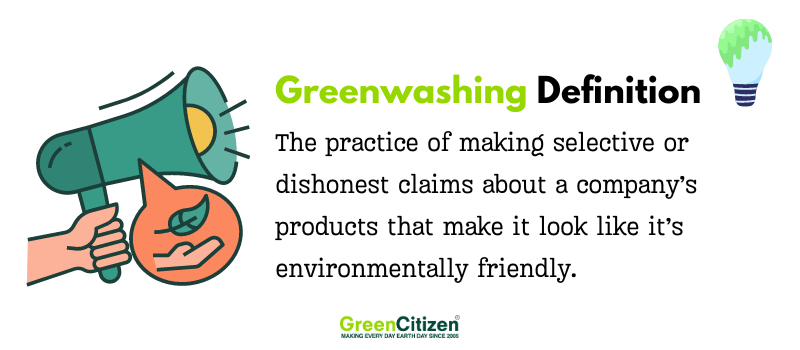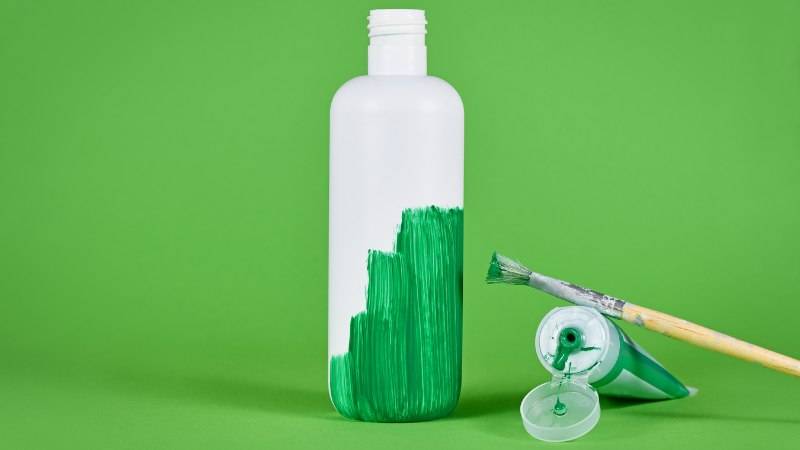If you watch some TV commercials or advertisements in magazines, you’ll find that there’s no shortage of companies that are trying to get on the environmental friendliness train.
While it’s encouraging to see that businesses and the public are showing increased levels of interest in environmentally-friendly products, you have to be very careful about the claims.
Unfortunately, there is a huge amount of greenwashing going on with clever marketing tricks and some vague references to a positive environmental impact that can lead consumers to make poor choices.
To help you better prepare yourself to identify false claims and avoid greenwashing, I’ve put together this post with details and examples of greenwashing.
What Is Greenwashing?
The word greenwashing has a similar meaning to the term “whitewashing,” which is a marketing tactic that uses false or vague claims to hide some less convenient truths.
Some people also refer to it as green sheen. If you’re looking for a clear greenwashing definition, we’d say — it’s a practice of making selective or dishonest claims about a company’s products that make it look like it’s environmentally friendly.

One of the most recent examples that come to mind is a major international oil company running advertisements about its investments in “sustainable” fuels. While these companies may well be exploring such investments, it’s a fraction of the profits they make from some of the most polluting practices on the planet.
Now, those kinds of examples might be obvious, but there are a lot more subtle practices in play as well.
What makes it so much more difficult is that there are companies with very heavily polluting business practices that spend more marketing their greenwashing claims than they are on actually making changes to their business practices with environmental benefits.
And how is the average consumer supposed to understand that a small cleaning product brand is owned by a huge multinational corporation that is responsible for some of the largest amounts of plastic waste?
Let’s first take a look at where things went wrong with green marketing.
The Troubling Past of Greenwashing
To understand a bit of the history around green marketing, we have to go back to the 80s when this practice started taking off a lot more in TV advertising.
Looking at some old commercials from corporate brands, you’ll find some interesting examples.
One of the craziest ads I saw requires a little bit of context. The petroleum company Chevron aired a campaign called “People Do,” and it was all about being environmentally conscious and painting Chevron as an environmentally responsible company.
But these were completely misleading environmental claims as Chevron, at the time, was being sued by the EPA for illegally polluting Santa Monica Bay.
Why would they do this and be so dishonest?
Basically, it’s because marketing yourself as an environmentally responsible company sells. Almost all consumers in a poll suggested that they make sustainability a priority in their purchasing choices.
The more these companies highlight some loose ties with the Forest Stewardship Council or having supported the funding of new green recreation areas, the more appealing they are to consumers.
And it all comes down to one thing.
Corporate Greed: The Driving Force Behind Greenwashing
Now, I’m all in favor of companies introducing sustainable business practices and talking publicly about doing so. But when those actions only provide lip service because, behind the smoke and mirrors, nothing really changes, then it’s clear that there’s only one driving force.
And that driving force is greed.

Using a positive environmental marketing claim has been shown to work well with people of all ages. Why not buy a product from a company that claims it has introduced sustainable practices at a higher price than another company that doesn’t use such green marketing?
And here’s why greenwashing is so effective. Sustainability reports have shown that two-thirds of consumers will spend more on a product if they think that it’s more sustainable.
That means that corporations can jack up prices significantly by investing millions in clever greenwashing and, at the same time, do practically nothing to reduce their impact on the environment.
That’s greenwashing at its best, and once you know what to look out for, you’ll avoid falling for such an environmental claim.
And the good news is that millennials and Gen Zs are a lot wiser and more aware that greenwashing is a rampant problem.
Why Greenwashing Is A Major Issue Today?
Greenwashing and green marketing are major issues for the environment, as misleading practices fool people into believing they are spending their money in a way that helps the environment.
And here are the main problems and causes.
Unknowing Negative Environmental Interaction
Making environmental marketing claims that a company has made major investments in renewable energy sounds like a good thing. But what if that investment is less than 1% of the company’s profits, and at the same time, the growth of the company causes more deforestation?
The company’s greenwashing marketing headline could read something like “$100 million dollar investment in solar panels” while at the same time, product demand increases non-renewable energy use by 5%.
If you support such companies with your spending, then you could be making things worse for the climate and environment rather than making improvements.
Directly Funding Bad Environmental Practices
You often see greenwashing campaigns where companies announce they will spend millions to help reforestation projects. Now imagine if that’s a paper company that then sees a huge increase in demand.
If that demand outstrips the reforestation project, then supporting that company will also become a major problem.
What you have to do is carefully analyze how a company is directly impacting the environment and whether they are taking drastic steps to become eco-friendly within a few years, not decades from now.
Overpaying For Misleading Environmental Claims
The other major issue with buying into greenwashing is that you could literally be handing over way more money for something that you think is more sustainable and environmentally friendly.
See, doing the right thing isn’t cheap when it comes to producing anything from your washing detergent to TVS and even furniture. If it was cheaper, then businesses would do it to save money and increase profits.
But when you fall for greenwashing tactics and pay more for a product that you think is going to reduce your eco-impact, you’re actually paying for the privilege of being lied to.
At the same time, you’ll reward companies that spend more on greenwashing rather than cleaning up their act and becoming more sustainable.
It’s simply the wrong message to send with your money.
The Common Types of Greenwashing

Here are some common types of greenwashing that can trigger green purchasing intentions
Vague And Misleading Language
One of the most common types of greenwashing is the use of vague and misleading language in advertising. While the Federal Trade Commission has rules around being overtly misleading in the way products are presented, there seems to be no shortage of gray areas.
What you’ll often see is green products being labeled as “eco-friendly” or “non-toxic,” with some kind of certification to back it up.
But if you look deeper into the “certifications,” they are often industry-funded greenwashing organizations. Basically, without strict regulation on using these terms, labels, and certificates, they can mean whatever the company wants them to mean.
Painting Environmental Pictures
You’ll often see products marketed with certain environmental color themes and images. It’s like washing detergents and cleaning products that aren’t biodegradably packed in green boxes with images of landscapes and animals.
This sends a hidden message of no or low environmental impact. And you can find this in all areas of the economy. From the hotel industry using greenwashing to lower the use of towels to electronics achieving better battery life not by using less energy but by increasing the battery size.
Falsifying Eco-Friendly Brand Image
Another common greenwashing practice is painting great pictures using recycled materials and installing solar panels. Not that those aren’t important steps to take.
But for a major corporation to invest a few million dollars in solar panels only for product demand to send energy use and greenhouse gas emissions soaring is completely dishonest and a trick to fool new buyers.
Irrelevant Distraction Techniques
This type of greenwashing can be a bit more difficult to identify, and you often need to dig deeper into the claims being made. What it involves is making positive statements about the environmental impact of “green products” by focusing on something that has been restricted through regulation.
A prime example would be for a product to highlight that it’s CFC-free despite the fact that there are international regulations that ban the use of CFCs. The same can be said for a whole host of different chemicals, and for a company to say they aren’t using something that has been banned is very dishonest.
Companies That Greenwash: Caught In 4K!
Now that you have an understanding of where greenwashing came from and how commonplace it has become in marketing, it’s time to show you some specific examples to help you spot greenwashing in your everyday life.
1 – McDonalds
This fast food giant had been under attack from environmental agencies for excessive use of plastics in all the packaging. So, in 2019, the company started a campaign to get rid of plastic straws.
It announced it would be using paper-based straws, and all the indications were that these would also be recyclable. However, it turns out that Mcdonalds’ straws are not fully recyclable, and they don’t use sustainable manufacturing techniques.
It’s one of the textbook examples of greenwashing.
2 – Coca Cola
This is one company that doesn’t deserve any kind of environmentally friendly labeling or advertising. Coca-Cola spent several years marketing itself through greenwashing by saying that it was committed to reducing plastic waste.
But as the largest plastic polluter in the world, that greenwashing was beyond a joke. It’s like a teenager saying he is committed to getting straight As in school but doing nothing to actually achieve it.
3 – Royal Dutch Shell
The Dutch government has brought multiple court cases against this oil producer over claims of greenwashing and unethical marketing practices.
The company has released multiple infomercials where executives talk about being in favor of net-zero projects. But when asked by journalists and later in court by lawyers how exactly the company was promoting such net-zero actions, there was nothing available to back up the greenwashing claims.
The reality is that Royal Dutch Shell continues to expand its environmentally damaging practices by further oil and gas exploration and increasing supply.
4 – Walmart
This retail giant also used clever greenwashing techniques in the last few years by highlighting that it was moving towards low-carbon emissions for all its stores. That certainly sounds like sustainable practices are a priority until you look closer at the entire business model.
As it turns out, the vast majority of the company’s carbon emissions don’t come from the stores that you visit. It actually comes from the supply chain, storage processing, transport, and manufacturing.
It’s the typical drop-in-the-ocean distraction greenwashing approach.
5 – Nespresso
Nespresso has spent millions greenwashing its aluminum coffee pods as recyclable, but it’s far from being some form of green packaging. With a heavy focus on making it easy for customers to bring their used pods back to a retailer, it seems like the company is focused on doing the right thing.
But processing those pods rather than implementing some sort of reusable pod is very misleading as it takes highly specialized and energy-intensive processes to recycle the pods.
6 – Unilever
Unilever is the third largest plastic polluter in the world, and its corporate environmental performance is full of greenwashing tactics. Despite making green claims about recycling more plastic than it produces by 2025, there’s plenty of evidence that the company is not using eco-friendly recycling techniques.
Instead of using fully recyclable plastic packaging, the company uses highly controversial chemical techniques.
Products That Are Vulnerable To Greenwashing
Another way to be better prepared to spot greenwashing is to be aware of certain products where it’s most common.
1 – Packaging
You’ll often find big greenwashing claims by companies highlighting that they use environmentally friendly packaging. More often than not, only some of the packaging is suitable for recycling, but even if it’s just 10%, the company will slap the recycling arrows in it.
You’ll find this with everything from cereal packaging to fresh fruit and detergents. In many cases, the cardboard boxes also include some plastics, which makes them less suitable or impossible to enter the standard recycling systems.
2 – Trash Bags
Many people have fallen for the greenwashing of trash bags made of cellulose materials. Companies market these as the ideal solution to make your trash more eco-friendly and reduce your plastic waste.
The problem is that when a compostable material ends up in a landfill, then it doesn’t compost in the way most people think of. Instead, compostable materials at a landfill will release methane, which is an even more potent greenhouse gas than CO2.
3 – Food
If you look at food products at a supermarket, you’ll find that greenwashing is rampant with the use of images of happy animals and beautiful nature. Some companies even resort to highlighting sustainable practices in sourcing the ingredients.
In most cases, even organic labeling doesn’t mean that something was produced sustainably. It just means that no chemical fertilizers were used, but the food could still come from mass-production farms.
4 – Appliances
If you check out any appliances, you’ll see that the majority of them will have an Energy-Star label. And while that does mean that they could be energy-efficient, you have to look at the bigger picture.
Unless you look at all the detailed energy usage plus the carbon footprint of making a new appliance, such green claims quickly evaporate and mean that consumers end up with higher carbon emissions.
5 – Cars
I don’t think there is a single carmaker in the world that hasn’t resorted to endless green marketing and greenwashing. You’ll see a lot of focus on the fuel efficiency of the latest vehicles. And in many cases, you’ll only achieve that kind of fuel mileage driving 30 mph on an empty road.
It also completely negates the damage these vehicles make in the first place. Not only will most people end up using a lot more fuel than advertised, but they might also be fooled into driving more than they otherwise would.
6 – Carbon Offsets
When implemented through properly audited and accredited carbon offset companies, this can be a great tool for companies to do the right thing quickly. Rather than wait for years to implement new manufacturing practices, the right budget can offset a huge portion of carbon emissions.
But unfortunately, many companies buy into carbon offset programs that sell the same project multiple times. Or, like what happened to British Gas, a company might pay for a reforestation project in South America owned by indigenous people with no need for new trees.
Signs Of Greenwashing And How You Can Avoid It
OK, we’ve covered some companies and products where greenwashing is commonplace. Now it’s time to gain some Jedi skills to avoid greenwashing in everyday life.
1 – Don’t Trust Any Marketing
I know this might sound a bit harsh, but if you see advertising that is only concerned with how environmentally friendly a product is and that it’s from a major multinational corporation, then the chances are that there’s a heavy dose of greenwashing involved.
Be skeptical and even cynical about all corporate advertising, and the more it looks like the company spends millions of dollars to create the commercials, the more you can assume that there’s some greenwashing going on, and then it’s time to apply some of the other tips below to see if you can confirm your suspicion.
2 – Verify Ingredients
Many companies use green marketing techniques to highlight their products as “natural shampoo” or “organic skin creams.” But such terms are not regulated, and they can mean anything the company wants them to mean.
The next time you’re in a supermarket, take a look at a natural beauty product and then take a photo of the ingredients list. Spend a few minutes researching those ingredients, and the chances are that most of them are synthetic chemicals.
You can also use this database of brands and products to verify all the ingredients that might not be as natural as the greenwashing claims.
3 – Credible Certifications
Only trust credible certification programs when it comes to anything that claims to be 100% natural or organic. Organizations like USDA and OEKO-TEX are excellent for a trusted certification.
And if you want to ensure that a company is doing what it says it is when it comes to carbon emissions, then the Carbon Trust Standard is where to look.
What will probably surprise you is how many companies create their own certification programs or just use a generic label with no real regulations or standards behind them.
4 – Hyped Up Sustainability
Even if you find products that have credible certificates that you can back up, the question is how those efforts go. And the more a company uses green marketing to hype up its product range, the more likely there is some greenwashing going on.
For example, if you see a large plastic bottle manufacturer highlight their efforts to offset carbon emissions and focus on that in all their marketing, then the big question is how much of the emissions are really being offset.
Companies will often say things like their corporate headquarters have reduced carbon emissions by 50%. But if the rest of the company accounts for 98% of all emissions, then that’s pure and simple greenwashing.
5 – All Talk No Proof
And finally, you’ll see plenty of advertising that focuses on animals and nature and claims about how important the environment is to the company. There can even be photos and videos of teams of employees spending time in nature.
But if you listen and watch carefully, many of these adverts don’t actually make any claims of improvement. They simply say things like “nature is important to us” or “we all share one planet.”
But unless there is tangible evidence to support specific claims about a company cleaning up its business processes, this is simply aimed at fooling people.
Conclusion
If you truly want to make sure that you buy green products from companies that have implemented green practices, then I suggest you stay away from most major corporations.
And to stay environmentally conscious, you’ll have to invest time and effort into fully researching what you buy. The good news is that once you start looking for greenwashing, you’ll become much better at identifying it.
It’s almost like you develop a sixth sense for it.
And once you find those greenwashed products, make sure that you share that information with friends and family. It’s important that more people don’t fall for it.


